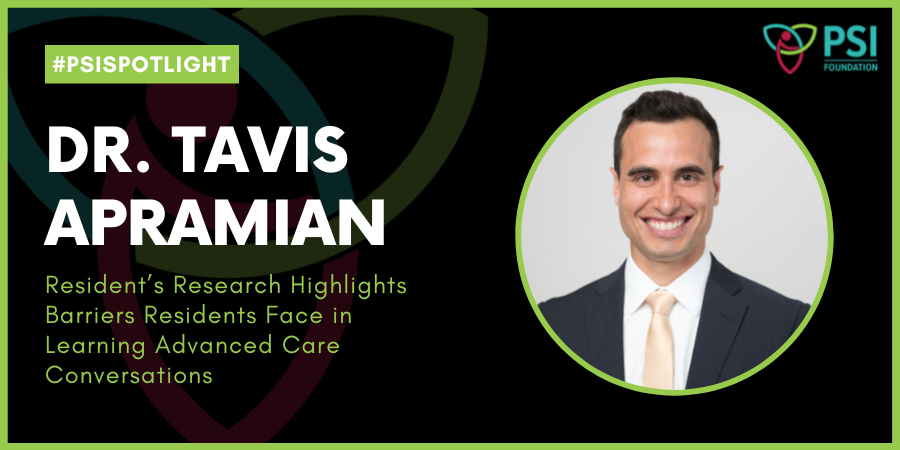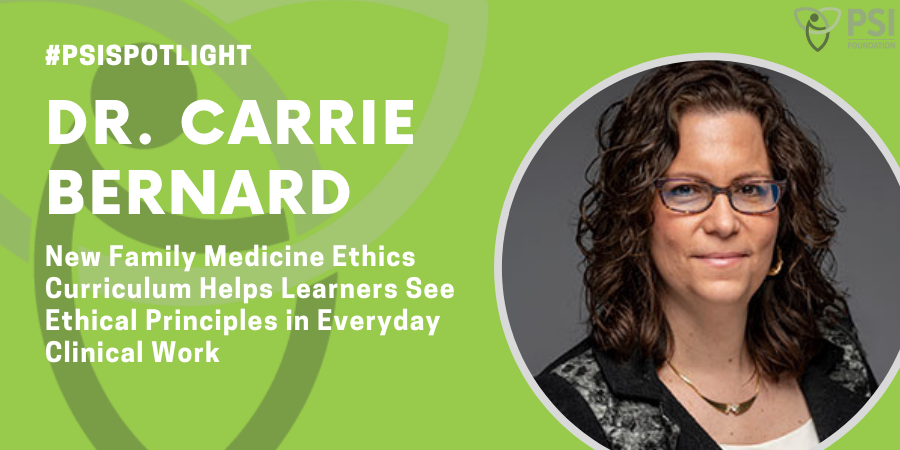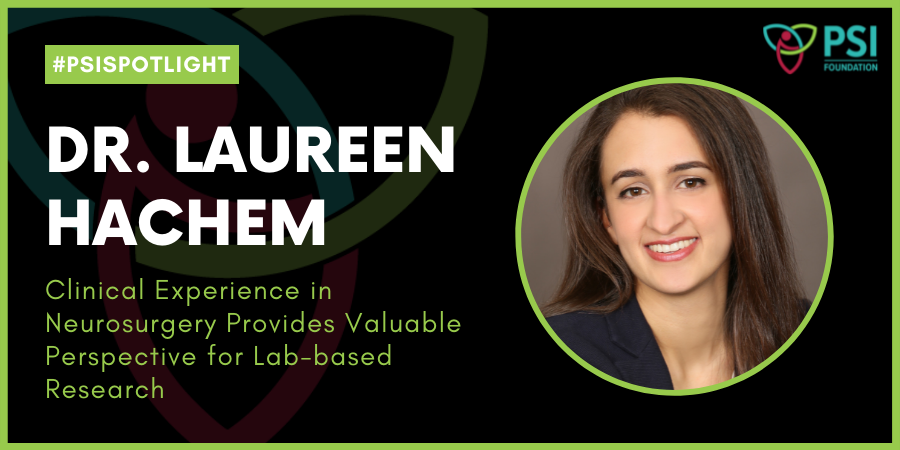“Learner-directed funding is critical to build skills in team leadership and direction and to create unique projects that tackle issues that learners themselves experience. I’m grateful to PSI for having the foresight to develop the next generation of scientists and education scientists in a deliberate way through the Resident Research Grants.” – Dr. Tavis Apramian
As both a learner and a researcher examining medical education, Dr. Tavis Apramian says he sometime felt as though he was navigating two worlds. During his residency in family medicine at McMaster University, he led research investigating how family medicine residents learn how to advance care planning conversations, with the goal of eventually improving education and training around this skill set.
“Studying medical education while acting as a learner is a little bit like living two lives at once,” says Dr. Apramian, now a palliative care fellow at the University of Toronto. “It helps me put some of the challenges I face into a broader systemic perspective, but it can also be challenging when I know that more evidence-based educational practices are available, but they might not be applied in a given situation.”
Dr. Apramian has long been interested in learning patient and physician stories and using storytelling to improve patient care. He studied English and biology at Carleton University and Narrative Medicine at Columbia University. He then focused his career on research and medicine, completing a PhD and MD at Western University.
When Dr. Apramian started his family medicine residency at McMaster University in 2019, he wanted to undertake research on medical education to try to affect positive change in how medicine is taught. He was specifically interested in how learners gain skills in advance care planning conversations, which require a complex skill set and are not typically taught in medical school.
Advance care planning conversations are often iterative conversations meant to help patients, typically with serious illness, understand the course of their disease, consider their values as they relate health care and make decisions about their future care.
Research has shown that fewer than 40% of family doctors regularly have these conversations with their patients with life-limiting illness, which suggests that residents may have limited opportunities to observe or participate in these conversations during a family medicine residency.
In 2020, Dr. Apramian received a PSI Resident Research Grant to investigate how family medicine residents learn to approach advance care planning. Working with Dr. Erin Gallagher as mentor and Dr. Michelle Howard as senior author, Dr. Apramian and the research team interviewed residents about their experiences to better understand if and how residents are learning these skills during their training and the factors that shape how they are taught these skills.
Residents face unique barriers to learning advanced care planning skills
Previous research has found that advance care planning conversations are challenging even for experienced physicians. These conversations are time-consuming and may take place over several appointments, and physicians often lack the time or flexibility in their schedules or access to clinical records to have these conversations effectively. In addition, physicians and patients often have cultural aversions to conversations about death and dying.
In the interviews led by Dr. Apramian’s team, residents described facing these same barriers, plus some specific to residency: lack of authority to shape clinic flow and schedules, short-term relationships with patients, navigating their preceptors’ clinical priorities, lack of encouragement from their preceptors, and limited opportunities to practice.
“The interviews demonstrated that the preferences and principles of family medicine preceptors affected how much time, energy, willingness and supervision that family medicine residents had to practice this skill set,” says Dr. Apramian. “These are really complex skills that require iterative and adaptive conversations. There’s certainly no training on advance care planning in medical schools, and little didactic or deliberate practice in the workplace once medical students reach residency, which is concerning.”
Importantly, the research team noted that, without this training in the primary care setting, many residents shifted to learning related skills during emergency department or internal medicine rotations through practising goals of care conversations, which are focused on an immediate clinical decision in a time of acute crisis.
“You can’t have conversations about values when patients are scared and uncomfortable and with physicians they don’t know or trust,” says Dr. Apramian. “I hope that what we found in our study will lead to more deliberate thinking about how to help residents practice the skill of building illness understanding and eliciting patients’ values in a family medicine setting.”
With the team now publishing and presenting the results, Dr. Apramian hopes that more awareness of the gaps in education will lead to changes in training that dedicate more time to practising this skill to increase future physicians’ comfort in leading these conversations and ultimately helping patients experience health care more aligned with their values. In his fellowship at the University of Toronto, he is planning to continue this research to examine advanced care planning in other clinical domains, including pain management.
Dr. Apramian says that the funding from PSI Foundation was critical to his research and has helped him to build a research program focused on medical education and the dynamics between learners and their supervisors.
“Having my own funding allowed me to hire team members to move the research forward while doing my residency,” he says. “Getting this grant allowed the research to continue and improve over the course of my residency in a way that wouldn’t have otherwise been possible.”



